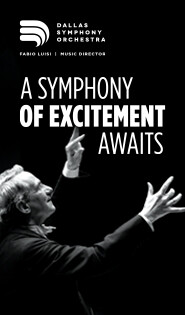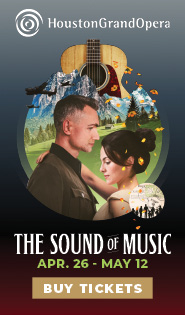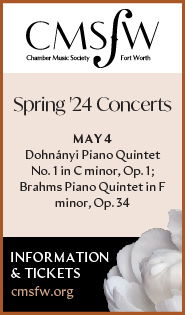DSO energetically rings in the holiday season with Tchaikovsky and Mozart

The Dallas Symphony Orchestra kicked off the Christmas season on Black Friday with a delightfully energetic program that opened with excerpts from Tchaikovsky’s holiday favorite, The Nutcracker. To mark the occasion, the Meyerson Symphony Center was itself decked out in winter holiday greenery and lights.
Under the baton of Gustavo Gimeno, artistic director of the Orchestre Philharmonique de Luxembourg and Toronto Symphony Orchestra, the Dallas musicians brought a wide range of expression to the evening’s fare. Gimeno’s conducting was succinct and gestural but never extravagant.
In the familiar suite from Tchaikovsky’s beloved ballet, the entire ensemble played in festive and buoyant fashion, with the strings especially taut. Suave winds over low-string drones highlighted the Arabian Dance, while the flutes were creamy and the brass section understated in the Dance of the Reed Flutes. Gimeno’s daringly quick tempo in the Russian Dance seemed to have startled the orchestra, throwing them out of sync for a brief few bars.
Alexander Kerr, the DSO’s concertmaster, was the soloist for Mozart’s Violin Concerto No. 5 (K.219), written by the 19-year-old composer.
The strings were reduced by about half for the concerto, scored with pairs of oboes and horns. Kerr’s playing was precise and nimble, his lines emerging smoothly from tutti phrases. His tone is sweet and was well matched with that of his orchestra, and the cadenzas were delivered with appropriate Apollonian style, avoiding romantic flamboyance.
Kerr’s sound seems perfectly suited for this repertoire. The oboes nearly covered the violinist for a portion of the slow movement, a rare case of Gimeno’s balancing problem during the concert.
The finale’s minuet theme that recurs in rondo fashion is interrupted by a lively “Turkish” march section in A minor marked by chromatic touches, during which Kerr’s playing turned fiery.
After intermission Kerr rejoined the orchestra for a suite from a very different ballet than The Nutcracker, Stravinsky’s Firebird. On this occasion Gimeno opted for the third suite from 1945 that the composer arranged for concert performance.
Dating from 1910, The Firebird was Stravinsky’s first international hit and the first in a string of successful ballet scores for Diaghilev’s Ballets Russes company based in Paris. It’s an accessible work, solidly Russian in its colors but not yet modernist.
Gimeno avoided the typically lugubrious beginning by taking the Introduction a little faster than most interpretations. The conductor’s feel for Stravinsky, evidenced by his recordings of the composer’s works with the Luxembourg group, was apparent in the effective variety he brought to Stravinsky’s dynamic and timbral contrasts.
Stravinsky’s lesser-known devotion to Tchaikovsky is apparent in the rhythms and orchestration of the Scherzo, which harkened back to The Nutcracker’s Dance of the Reed Flutes.
The Firebird also shows how Stravinsky had already proved his mastery of the Russian orchestration techniques inherited from his teacher Nikolai Rimsky-Korsakov, and the DSO players clearly reveled in the work’s colorful palette. Reeds and other woodwinds were articulate, while each section of the strings had opportunities to shine. There were also cogent glimpses of the special timbres of piano and harp.
The brass section was meticulous and punchy but not overbearing. The most notable solos in the piece for flute, horn, violin, cello, and especially bassoon were all elegantly persuasive. Gimeno’s assured and graceful direction brought exhilarating precision to the entire orchestra, which responded enthusiastically to his leadership and made for a lively performance.
The program will be repeated 7:30 p.m. Saturday and 3 p.m. Sunday. dallassymphony.org


